
Carly Hanna
BSc (Human Nutrition and Psychology)
Note — The article was checked and updated June 2024.
Jump to:
- What is Magnesium?
- Magnesium deficiency
- Different types of Magnesium
- Health Benefits
- Health Claims
- Best sources of Magnesium
- Daily requirements and intake
- How to take Magnesium supplements
- Signs and symptoms of deficiency
- Risks and side effects
- Interactions - herbs and supplements
- Interactions - medication
- Summary
- Related Questions
Magnesium is an important mineral for our overall health, and while it is best to obtain our nutritional needs from the diet first, the rise in processed foods has resulted in decrease of nutritional intake of magnesium.
Before deciding on a supplement, we need to be aware that there are several types of magnesium with different absorption rates and effects on the body.
Also, we need to be aware of signs of a magnesium deficiency, health benefits of supplementing with magnesium, but also potential risks of having too much magnesium.
All of these are covered in more detail in this article.
What is Magnesium?
Magnesium is a mineral that is essential for body processes such as glucose metabolism, mood, and DNA repair.[1] It also helps heart, bone, muscle and nerve function.[2]
Magnesium is abundant in several plant-based foods and in seafood. However, in some circumstances, magnesium from the diet alone may not be sufficient so we may need additional supplementation.
RELATED — What is a plant-based diet: Vegan or Vegetarian?
Magnesium was first discovered as magnesium carbonate in the Greek city of Magnesia, hence the name. Due to its properties, magnesium salt was first used as a laxative, and still is to this day, and is also used as an antacid.[3]

The rise in more processed foods has resulted in a loss of magnesium in the diet, especially comparing wholegrains to refined grains.[3] Common foods found naturally with high levels of magnesium include
- Legumes
- Wholegrains
- Nuts and seeds
- Green leafy vegetables
- Seafood
- Dairy products
Some tap water can also contain levels of magnesium.
Magnesium is not a mandatory fortification standard in New Zealand
It is believed that magnesium has several benefits and can help with
- Muscle cramps
- Sleep issues
- Blood pressure
- Mood
Though how evident are these claims, and are they reasonable enough to consider taking a magnesium supplement?
Like anything, everyone’s nutritional needs are different, though there may be certain populations that are more at risk of a magnesium deficiency.
Magnesium deficiency
As magnesium is found in an abundance of foods and the body is good at regulating its magnesium levels, it is rare to be deficient in magnesium.
However, a magnesium deficiency can be a result of the body excreting too much magnesium due to underlying medical conditions, such as bowel and/or kidney dysfunction.
If you are deficient in magnesium, it is also likely that you are deficient in other vitamins and minerals as well.
Common signs of magnesium deficiency can include
- Muscle weakness and cramps
- Mood changes
- Fatigue
- High blood pressure
- Loss of appetite
- Heart arrhythmias
- Nausea and numbness
These will be explained more in depth further in the article.
It is important to note that nutritional intake doesn’t necessarily correlate to nutrition status, as there are several factors that contribute to our body’s nutrient stores.
These include different types of magnesium and their bioavailability, interactions with other minerals and medications, as well as individual needs.
So – who is most vulnerable regarding inadequate intake of magnesium?
Who is most at risk of Magnesium deficiency?
Magnesium is absorbed by the intestines, but it can also be reabsorbed through the renal system (kidneys) in order to maintain homeostasis (a state of balance, in this case with magnesium levels).
Any individual who is at risk of increased magnesium loss from urine or poor absorption in the intestines may require long-term supplementation.[4]
Use of diuretics and magnesium
Diuretics, such as alcohol, caffeine, and sugar, can cause a loss of nutrients such as magnesium.
Alcoholism is the most common cause of magnesium deficiency due to individuals’ poor nutritional status and chronic GI problems.[5]

Diabetes, insulin resistance and magnesium levels
Diabetics or individuals with other blood sugar abnormalities, such as insulin resistance, are also at higher risk due to having to maintain their carbohydrate intake (foods where magnesium is often found), and also because of their increased urinary excretion. These can affect levels of magnesium in the body.
RELATED — Diabetes: Early Signs, Causes, Types and Treatment
Diets high in processed food, sodium and calcium
Individuals who consume a diet high in processed foods, such as junk food and takeaways, are likely to be missing out on key nutrients, such as magnesium.[4]
RELATED — Sodium (for nerve health, and fluid and minerals equilibrium)
Diets high in sodium, calcium and caffeine may increase magnesium loss
Low micronutrient levels and their impact on magnesium
Individuals who have low serum potassium, calcium, and/or vitamin D levels are also likely to be deficient in magnesium as well.
RELATED — Calcium (for healthy bones, teeth and heart)
Magnesium is essential for the activation and metabolism of vitamin D, which is a common deficiency that often goes underdiagnosed.
Medications and their relation to magnesium
There are also some medications that interfere with magnesium absorption. This include
- Thiazide
- Diuretics for blood pressure
- Long-term antibiotics
- Proton pump inhibitor
- Antacids

Increase loss of fluids and decreased absorption of magnesium
Excessive loss of bodily fluids from prolonged diarrhea, Crohn’s disease and chronic laxative use are also likely to cause a magnesium deficiency.
Decreased intestinal absorption of magnesium or decreased intake can be due to starvation, calorie or protein malnutrition, or ketoacidosis.[5]
Gastrointestinal disorders and decreased absorption of magnesium
Certain gastrointestinal disorders, such as Coeliac disease, malabsorption from gluten sensitivity and renal diseases will most likely cause magnesium deficiency.[4]
RELATED — Coeliac Disease: Symptoms and Effects on our health and body
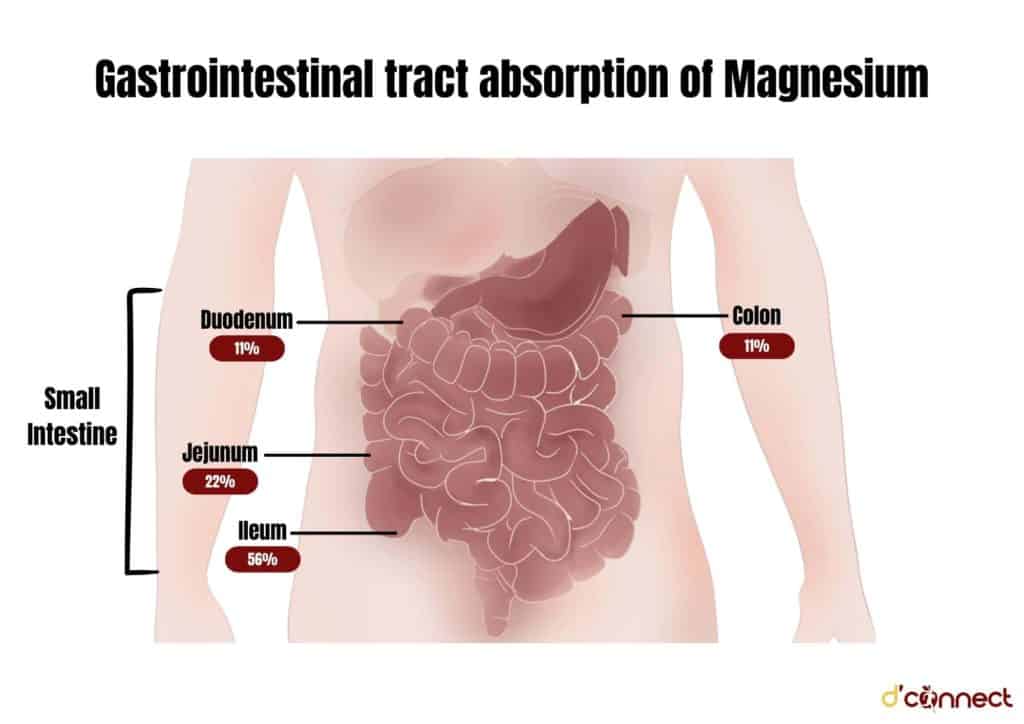
Anyone who is unwell or hospitalized for conditions such as
- Diarrhea
- IBD
- Gastric bypass surgery
- Rare genetic condition
- People who smoke and drink
are also more likely to be magnesium deficient.[1]
Senior, elderly and magnesium levels
Seniors and elderly are generally more at risk of several nutritional deficiencies, such as magnesium, due to reduced appetite, poor absorption and renal/gastrointestinal functions, chronic disease, and long-term medication use.
Different types of Magnesium
As an element, magnesium is water soluble when bound with oxygen. When we think about taking a supplement, we may think that one size fits all. However, magnesium can come in several forms and can vary on bioavailability (how easily it is absorbed in the body).
Liquid forms are generally more soluble than solid forms, but this also depends on what compounds are bound to it.[2] So let’s take a look at the different types of magnesium.
Magnesium aspartate
This compound is made up of magnesium and aspartic acid and is one of the most absorbable magnesium supplements on the market. It is known to help with muscle fatigue and hyper excitability of the muscles (stiffness, spasms, and twitches).[6]
Magnesium carbonate
Magnesium carbonate is a mineral supplement, often known as magnesium salts. While this is usually used to treat low magnesium levels, it can also help with symptoms such as heartburn and indigestion.[7]
Magnesium chloride
Magnesium chloride is also one of the most absorbable forms of magnesium used as a supplement. With the addition of chloride ions, and often in liquid form, this makes it easier to bind to other compounds in the body. It is naturally found in seawater and is good for kidney function and metabolism.[2]
Magnesium citrate
As the name suggests, this type of magnesium is bound with citric acid so is commonly found in citrus fruits and liquid supplement form. While it has a high bioavailability and is easily absorbed into the body, too much of it can cause a laxative effect.[2]
Magnesium gluconate
Both the salt and non-salt versions of this compound have a high bioavailability, however, magnesium only makes up 5% of the molecule itself.
This form of magnesium is useful for leg cramps and migraines and is also safest for long term use.[8]
Magnesium glycinate
Magnesium glycinate is the most absorbable supplement form of magnesium and is the easiest on the stomach to digest. However, those with kidney problems should take precautions when taking this supplement.[9]
Magnesium oxide
This is the most common supplement form used as a laxative or to relieve heartburn. It is usually in solid tablet form, however, it only has a 4% absorption rate.[6]
Magnesium phosphate, dibasic and tribasic
Magnesium phosphate can come in either a dibasic or tribasic form. The difference between these two depends on the composition of magnesium and phosphate compounds.
Magnesium phosphate, dibasic, is more commonly used as a laxative, whereas the magnesium phosphate, tribasic form is better used as an antacid.[10]
Magnesium sulphate
This type of magnesium is found in Epsom salts, and is believed to soothe muscle aches and relieve stress.[2]
Magnesium orotate
This form of magnesium has a high absorption rate and doesn’t cause laxative effects. It is a good supplement for cardiovascular health, including helping with blood pressure, irregular heartbeats and palpitations.[2]
Best absorption form of magnesium
Overall, magnesium from food is better absorbed in the body (70%) than supplement form (varying %).[11]
In terms of supplements, magnesium glycinate has the best absorption rate.
Safest form of magnesium to use long term
Magnesium gluconate is the safest to use long term as it has minimal side effects.
Most expensive form of magnesium
Due to its high bioavailability and production costs, magnesium glycinate is the most expensive magnesium supplement.
Least expensive form of magnesium
Magnesium oxide is the most widely used and the cheapest form of magnesium supplements, sold at supermarkets and pharmacies.[6]
Health benefits of Magnesium
Magnesium is involved in more than 300 enzymes that help build proteins, regulate blood sugar, blood pressure, muscle and nerve functions.[2] Due to this, there are associated health benefits of having sufficient magnesium levels, as listed below.
Effective for indigestion and constipation
Magnesium has definite evidence to be helpful for constipation (as a laxative effect) and indigestion (as an antacid to reduce heartburn).[12]
Adenylate cyclase and phosphoinositol-linked second messenger systems
Yes, this sounds quite long, but it is also quite important. Second messenger systems are a way that cells signal to each other in order to carry out processes in our body.
Magnesium is important for phosphoinositol and adenylate cyclase pathways which are essential for protein, energy and tissue function.[13]
Ion channel regulation
The membrane potential is the electrical difference between the inside and outside of a cell.
Magnesium regulates membrane potentials by controlling the transport of potassium and calcium in and out of our cells.[13]
When magnesium is low, intracellular calcium (calcium levels inside the cell) increases while intracellular potassium (potassium levels inside the cell) decreases.[4] This, therefore, affects the membrane potential and effects the cell’s ability to send messages around the body.
RELATED — Potassium (for blood pressure, heart rhythm and pH balance)
DNA, RNA and protein synthesis
Magnesium is important for protein and fat synthesis, muscle contraction and cell membrane permeability (as most abundant positively charged ion in extracellular-fluid).[4]
Neuromuscular junctions modulation
Magnesium is responsible for the stabilization of nerve axons and the release of neurotransmitters, such as calcium, at neuromuscular junctions.
Disrupted magnesium levels can cause symptoms such as
- Tremors
- Weakness
- Depression
- Psychosis (in extreme cases)[4]
Secretion and action of parathyroid hormone
The parathyroid glands are pea-sized glands in the neck that produce parathyroid hormone (PTH) in order to control levels of calcium in the blood.
Magnesium is also required for the secretion and action of the PTH. When we are magnesium deficient, the functioning of PTH becomes impaired which affects skeletal metabolism and can lead to hypocalcemia (low calcium levels).
Preventing calcification
Magnesium affects the parathyroid hormone, which along with vitamin D, are regulators of calcium homeostasis and bone structure and function. [13]
RELATED — Vitamin D: The sunshine hormone for stronger bones
Sufficient magnesium levels will help prevent osteoporosis
This means that 50-60% of the magnesium stores in our body are in bone, and high concentrations of magnesium will inhibit calcification of the bone.
Health claims that still need more evidence and research
Alleviating PMS (Premenstrual syndrome) symptoms
There have been reports that magnesium supplements can help with PMS symptoms such as mood changes, bloating, cramps, and migraines.[12]
Improving mental health
Magnesium L-threonate is believed to be good for neurological issues and mental health disorders such as mild-moderate anxiety and depression.[5] However, more research is needed to explore this multifaceted issue.
RELATED — Depression Signs and Symptoms: Stop the downward spiral in time (Part 1)
Migraines
Intravenous magnesium is possibly effective for cluster headaches and/or migraines, though evidence is not well supported.[5]
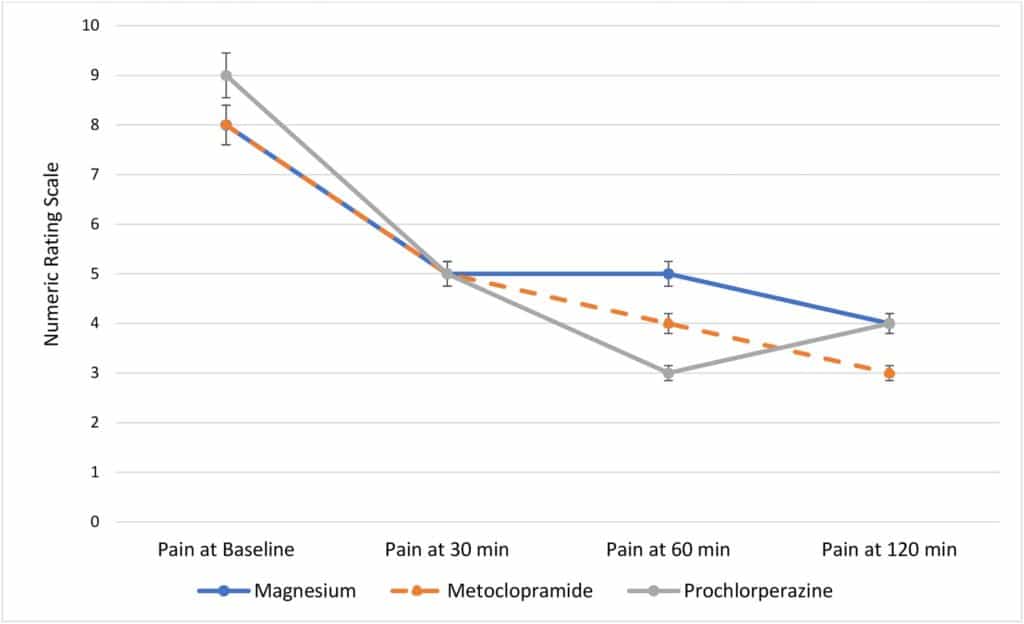
Severe asthma
Some evidence shows that intravenous magnesium can help with severe asthma attacks, however, not in those with long-term asthma.[12]
Sleep problems such as restless leg syndrome
The urge to suddenly move one’s legs is known as restless leg syndrome (RLS), and magnesium is known to be a homeopathic remedy for such sleep problems.[12]
Diabetes and glucose regulation
Some studies show that magnesium supplements can help improve insulin resistance and decrease the risk of diabetes in healthy individuals.
Magnesium is involved in carbohydrate regulation and insulin secretion, processes that are disrupted in Type II diabetes. When blood sugar is high, the kidneys may lose their ability to maintain magnesium.[3]
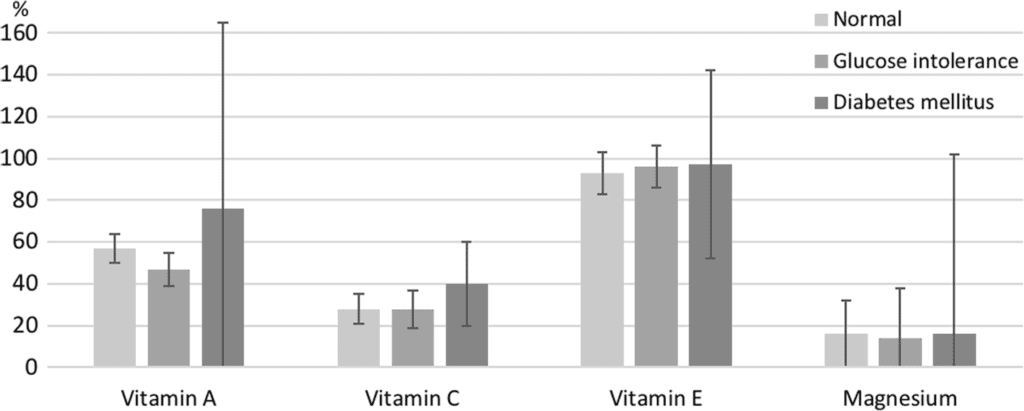
Muscle cramps
One study shows that magnesium supplements are no better than a placebo effect for nocturnal leg cramps.[14] So while some may experience benefits due to placebo, more research still needs to be done to explore this association, or lack of.
Best sources of Magnesium
The best way to remember what foods are generally high in magnesium is that these foods are also high in fibre.[10]
The table below lists the food sources highest in magnesium.[15]
This is calculated by the amount of magnesium per 100g, which differs from serving size (serving size is also estimated in the table below).
|
Food Sources |
Concentration (mg/100g) |
Daily Value (DV) Men / Women (>31 years) |
| Nuts (such as almonds and cashews) | 280mg (about 100 nuts) | 67% / 88% |
| Dark chocolate (70% cocoa) | 224mg (3.5 servings) | 53% / 70% |
| Spinach and leafy greens | 79mg (4 cups loosely packed spinach) | 19% / 25% |
| Legumes (such as lentils, chickpeas, black beans) | 36-70mg (100g cooked) | 9-17% / 11-22% |
| Seeds (such as pumpkin and sunflower) | 68mg (per 3.5oz/100g) | 16% / 21% |
| Wholegrains (such as quinoa, buckwheat, brown rice, oats) | 39-64mg (100g cooked) | 9-15% / 12-20% |
| Tofu | 58mg (100g raw firm tofu) | 14% / 18% |
| Peas | 39mg (100g cooked) | 9% / 12% |
| Edamame | 38mg (⅔ cup = 100g) | 9% / 12% |
| Bananas | 32mg (per medium banana/100g) | 8% / 10% |
| Sweet Corn | 32mg (medium ear of sweet corn) | 8% / 10% |
| Fatty fish, such as salmon | 30mg | 7% / 9% |
| Broccoli | 29mg (for one small stalk/100g) | 7% / 9% |
| Avocado | 26mg (100g = about ¾ avocado) | 6% / 8% |
| Greek Yogurt | 11mg (per 100g) | 3% / 3% |
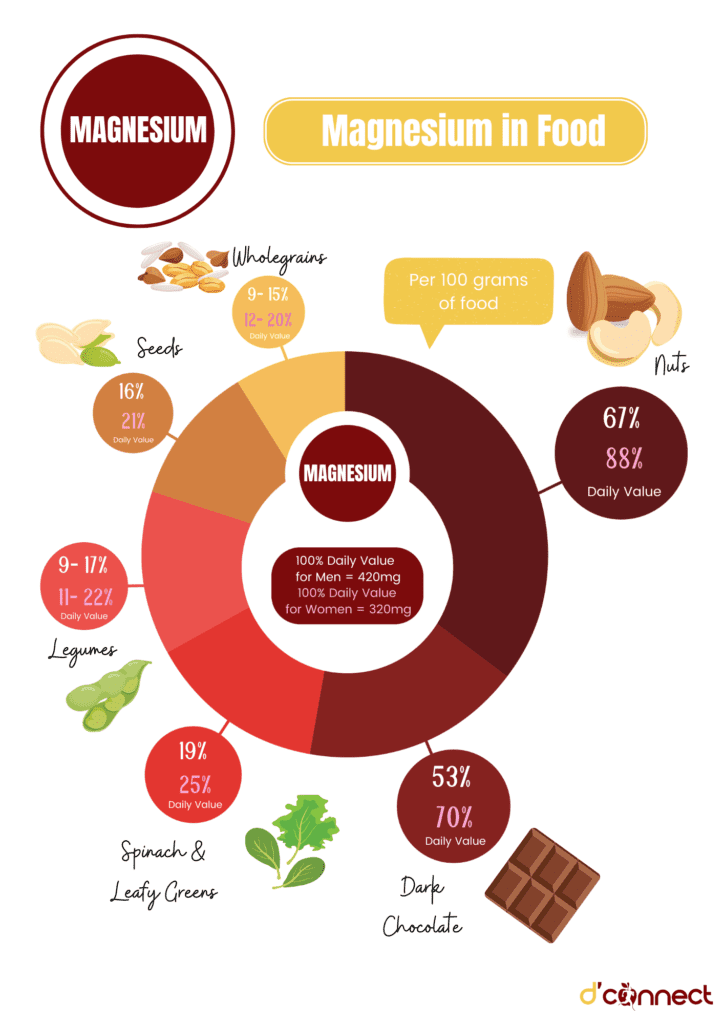
Note — a combination of nuts and vegetables should cover most of your daily needs for magnesium.
Daily requirements and recommended intake
The Recommended Daily Intake (RDI) is the average nutrient requirement to meet the needs of 97-98% of the total healthy population. This may differ between different age groups, genders, and/or life stages.
The RDI for magnesium is listed in the table below.[16]
| Age | Male | Female |
| 0-6 months | 30mg | 30mg |
| 7-12 months | 75mg | 75mg |
| 1-3 years | 80mg | 80mg |
| 4-8 years | 130mg | 130mg |
| 9-13 years | 240mg | 240mg |
| 14-18 years | 410mg | 360mg* |
| 19-30 years | 400mg | 310mg* |
| >31 years | 420mg | 320mg* |
* extra 30-40mg if pregnant, same requirements when lactating.[2]
How to take Magnesium supplements
Different minerals compete for absorption
Due to the nature of the element, magnesium also fights for absorption with calcium, zinc, iron.
So if you also take these supplements, it is best to take them separately and not at once.
Common signs and symptoms of Magnesium deficiency
Long term magnesium malabsorption can cause a range of side effects.
As mentioned previously, magnesium deficiency can occur because of large magnesium losses in the urine due to alcohol use, medications, and/or underlying health conditions, and rarely through a deficient diet. Some of these side effects may also correlate with magnesium toxicity.
Neuromuscular symptoms of magnesium deficiency
Asthma
Breathing problems may be caused as a result of a few nutritional deficiencies, such as iron and/or magnesium. In some circumstances, asthmatic symptoms, such as wheezing, have been presented in cases where magnesium levels are low.[4]

Fatigue and muscle weakness
Having a decrease of magnesium at the neuromuscular junctions can be the mechanism of action resulting in muscle fatigue and weakness. This is also due to differing levels of potassium and calcium levels (membrane potential) which are controlled by magnesium.[4]
Muscle twitches and tremors
Muscle movements are controlled by the attachment and detachment of actin and myosin (motor proteins in the muscle), which magnesium helps facilitate. It is commonly reported that being deficient in magnesium results in involuntary muscle movement such as twitches and tremors. This can include eyes or limbs.[4]
Numbness and tingling
As magnesium is important for muscle and nerve function, not having enough magnesium can result in symptoms such as numbness and tingling. This is common to experience in the extremities eg. toes, fingers, and in the face.
Mood disorders
Magnesium deficiency can manifest as personality changes, including aggression and states of confusion. Changes in mood are another possible consequence of magnesium deficiency as magnesium is crucial for the central nervous system function – including the brain.
These could manifest as potential depression and anxiety symptoms, such as apathy and irritability.[5]
RELATED — Introduction to Anxiety: Know what you are dealing with (Part 1)

Seizures
In severe cases of magnesium deficiency, ataxia (lack of muscle control) can progress to more dysregulation of voluntary movements and even lead to seizures.
This is likely to occur when the intestinal absorption of magnesium becomes affected and hypocalcaemia occurs (low calcium levels in the blood).[17]
Cardiovascular symptoms of magnesium deficiency
Abnormal heart rhythms
Atrial or ventricular arrhythmias can occur as a result of a magnesium deficiency.[4]
This could be due to magnesium’s reduced effect on active transport of potassium out of the cell membranes of the heart, which results in higher intracellular potassium levels causing abnormal heart rhythms.
Atherosclerosis
Magnesium deficiency has been associated with heart diseases due to its effect on fat metabolism and blood pressure.[3] Being deficient in magnesium has shown to increase platelet aggregation which is known to lead to atherosclerosis.
High blood pressure
Magnesium deficiency and hypertension are common in diabetics and alcoholics and have a close association.
Magnesium is important in maintaining blood pressure
Being low in magnesium may result in hypertension.[4] The mechanisms for this are not thoroughly understood.
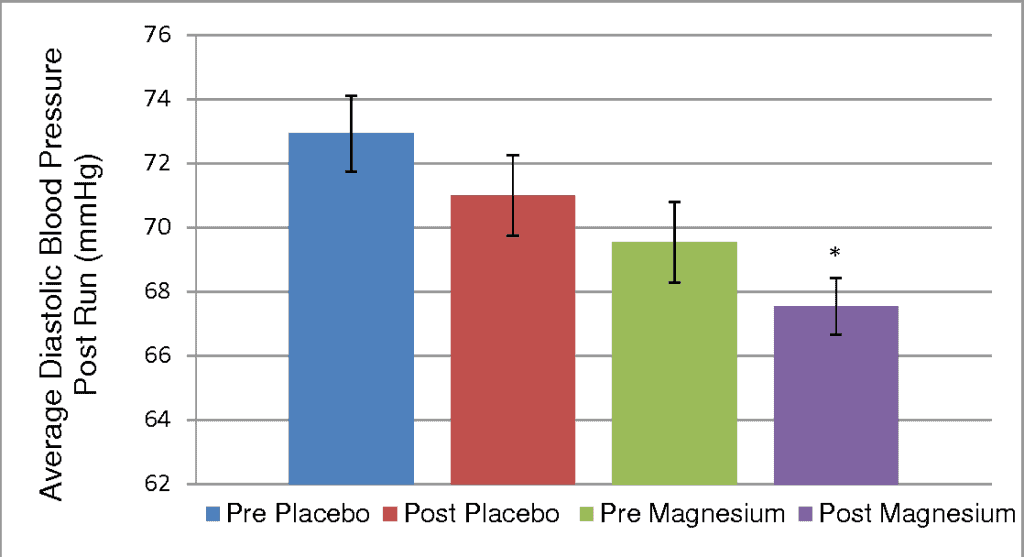
Gastrointestinal symptoms of magnesium deficiency
Abdominal pain
Abdominal pain may be a result of a magnesium deficiency and is more commonly experienced after earlier signs of gastrointestinal symptoms, such as nausea and vomiting, if untreated.[16]
Diarrhoea and/or constipation
As magnesium is mainly used as an antacid and laxative, it is common if you have a magnesium deficiency to experience diarrhoea and/or constipation. This can either be short term (due to an illness) or long-term (due to a disease/condition).[3]
Loss of appetite
A magnesium deficiency may manifest as dysphagia (difficulty swallowing) and a reduced appetite, which makes it hard to eat food and obtain all the nutrients your body needs.[17] Dysphagia is common in conditions such as Multiple Sclerosis.
RELATED — Let’s Talk about Multiple Sclerosis (Awareness Day)
Nausea and vomiting
A magnesium deficiency may be a result of increased loss of bodily fluids, such as nausea and vomiting. However, nausea and vomiting may also be a result of a magnesium deficiency.
Those with bulimia (an eating disorder characterized by various forms of binging and purging) are also likely to be deficient in magnesium, along with other micronutrients.
RELATED — Understanding Eating Disorders: History, Types and Statistics
Other symptoms
Osteoporosis
Magnesium deficiency can cause elevated PTH levels in the blood due to decreased enzyme activity.[13]
This can cause hypocalcemia (low calcium serum levels) and result in decreased bone resorption, bone volume, and increase in fragility, which increases our risk of osteoporosis.[4]
Magnesium risks and side effects
Like with any other nutrient, the body is always trying to maintain homeostasis and whether something is “healthy” or “not”, everything should be consumed in moderation.
While the body can get rid of excess magnesium, there may be side effects of taking too much magnesium from supplements.
This can include mild effects such as
- Diarrhoea
- Nausea
- Cramps
- Low blood pressure
- Muscle weakness
More severe side effects include
- Slowed breathing
- Confusion
- Paralysis
- Irregular heartbeat
- Coma
The upper limit recommendation for magnesium supplements (by mouth), which is the safe amount without any side effects, is 350mg/day for those aged 9 years and above. Intravenous magnesium is likely safe by prescription only and used correctly by a health professional.
Large doses of magnesium can build up the body’s nutrient supply, which can result in serious side effects due to magnesium toxicity.
These symptoms can include nausea, vomiting, diarrhoea, low mood and depression, muscle weakness, low blood pressure and irregular heartbeat. This can be seen where the upper limit is exceeded, especially in patients that have kidney dysfunction.[16]
Before you take any supplement, it is always best to speak to a health professional about your current regime and potential interactions an additional supplement might bring.
Possible interactions with herbs and supplements
As mentioned previously, magnesium competes for absorption in the body against other minerals such as calcium, iron, and zinc.
RELATED — Zinc (for immunity, skin health and libido)
In order to get maximum absorption from all of these nutrients, it is best to consume these supplements separately, and if possible, foods that are high in these particular nutrients.
We may have to be cautious about taking some herbs alongside supplements, such as magnesium.

Source: Melony @ Unsplash
Herbs that also interact with heart medications such as St John’s Wort (supplement used to treat mild-moderate depression) and ginkgo (supplement used for memory problems) can interfere with calcium channels.
RELATED — St John’s wort (Hypericum perforatum)
All of these herbs and supplements can interfere with the heart and blood pressure if mixed.
Possible interactions with medications
Diuretics (such as thiazide and amiloride) increase urinary magnesium loss so aren’t advised to take alongside magnesium supplements.
Long-term antibiotics (such as tetracyclines and quinolones), combine with magnesium to form insoluble “soaps” that cannot be absorbed so taking a supplement is not recommended.
Magnesium supplements may cause serious side effects (as listed above) when taken with heart medications (such as anticoagulants). Magnesium can also interfere with thyroid, blood pressure and kidney (ACE inhibitors), and diabetes medication.
Magnesium may also interfere with other drugs and medications such as immunosuppressants (penicillamine), chemotherapy drugs (cisplatin), and NSAIDs (such as ibuprofen).[18]
Summary
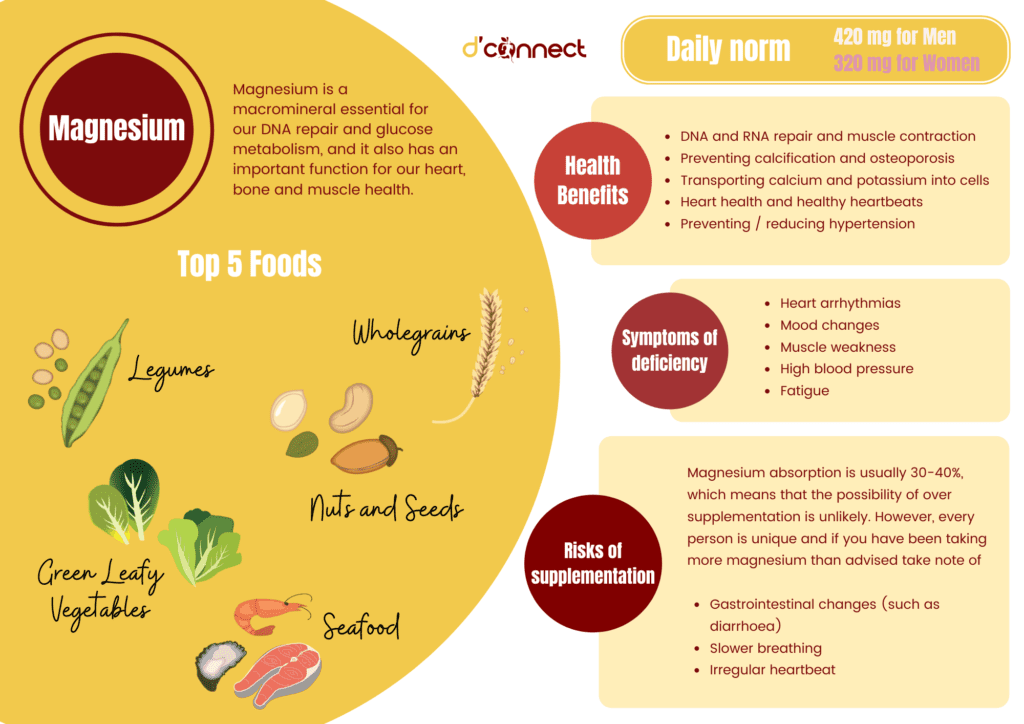
Related Questions
1. What is the best form of magnesium supplement?
Due to its higher bioavailability, compared to other supplements, and the fact it’s easiest on the stomach to digest, magnesium glycinate is the best form of magnesium supplement.
2. Does our body absorb magnesium from Epsom salt baths?
While our skin is the biggest organ in our body, the rate at which magnesium is absorbed from epsom salt baths isn’t as effective as taking a supplement. However, there is no harm in using these as an effective muscle relaxant.
3. Is magnesium good for menopause hot flashes?
While magnesium supplements can help with PMS symptoms, there is some evidence that it can help with hot flushes during menopause as well. However, more research is needed to understand the mechanisms of this.
RELATED — Menopause Revealed: Signs, Stages, Types and Treatment
4. Will magnesium help with better sleep?
There is evidence to suggest that magnesium supplements can help with nocturnal leg cramps and restless legs syndrome – both of which can help you sleep better.
RELATED — Great Sleep means Great Health: 17 Health Benefits of Good Sleep
5. Is potassium or magnesium better for leg cramps?
There are several factors that contribute to muscle and nerve function – including both potassium and magnesium.
Bananas are a great source of both magnesium and potassium, and are known to help with leg cramps. Overall, having good levels of both minerals and electrolytes are important.
If you can’t wait and would like to know when the next article in the series will be coming out, you can join our healthy community and Subscribe to our Newsletter.
Having passion for mental health and nutrition, Carly’s goal is to become a registered psychologist with a focus on self-care – food, exercise, and sleep. She has a special interest in various mental health disorders, plant-based diets, and the relationship between food and mood…
If you would like to learn more about Carly, see Expert: Carly Hanna.
References
(1) Health Navigator. Magnesium Supplements. Online. 2010 Nov 10. Accessed 4/2/22. Retrieved from https://www.healthnavigator.org.nz/medicines/m/magnesium-supplements/
(2) The Nutrition Source. Magnesium. Online. 2022. Accessed 4.2.22. Retrieved from https://www.hsph.harvard.edu/nutritionsource/magnesium/
(3) Chaudhary DP, Sharma R, Bansal DD. Implications of magnesium deficiency in type 2 diabetes: a review. Biological trace element research. 2010 May;134(2):119-29. Retrieved from https://link.springer.com/article/10.1007/s12011-009-8465-z
(4) Rude RK. Magnesium deficiency: a cause of heterogenous disease in humans. Journal of bone and mineral Research. 1998 Apr;13(4):749-58. Retrieved from https://asbmr.onlinelibrary.wiley.com/doi/full/10.1359/jbmr.1998.13.4.749
(5) Rasmussen HH, Mortensen PB, Jensen IW. Depression and magnesium deficiency. The International Journal of Psychiatry in Medicine. 1990 Mar;19(1):57-63. Retrieved from https://doi.org/10.2190%2FNKCD-1RB1-QMA9-G1VN
(6) Life Pharmacy. Magnesium Cheap vs Effective. Online. 2020 Jan. Accessed 4/2/22.
(7) Web MD, Magnesium carbonate: Uses side effects and more. Online. 2022. Accessed 4/2/22. Retrieved from https://www.webmd.com/drugs/2/drug-11359/magnesium-carbonate-oral/details
(8) Intelligent labs. Magnesium the ultimate supplement guide. Online. 2019 Nov 9. Accessed 4/2/22. Retrieved from https://www.intelligentlabs.org/magnesium-ultimate-supplement-guide/
(9) Medical news today. The uses the benefits of magnesium glycinate. Online. 2018 July 27. Accessed 4/2/22. Retrieved from https://www.medicalnewstoday.com/articles/315372#risks-and-complications
(10) International Programme on Chemical Safety, World Health Organisation. Calcium and Magnesium phosphates tribasic. Online. Accessed 4/2/22. Retrieved from https://inchem.org/documents/jecfa/jecmono/v46aje58.htm#:~:text=Magnesium%20phosphates%20are%20mostly%20insoluble,of%20magnesium%20and%20phosphate%20ions.
(11) Fine KD, Santa Ana CA, Porter JL, Fordtran JS. Intestinal absorption of magnesium from food and supplements. The Journal of clinical investigation. 1991 Aug 1;88(2):396-402. Retrieved from https://www.jci.org/articles/view/115317/pdf
(12) Rx List. Magnesium. Online. 2021 Nov 6. Accessed 4/2/22. Retrieved from https://www.rxlist.com/magnesium/supplements.htm
(13) Rude RK, Singer FR, Gruber HE. Skeletal and hormonal effects of magnesium deficiency. Journal of the American College of Nutrition. 2009 Apr 1;28(2):131-41. Retrieved from https://www.tandfonline.com/doi/pdf/10.1080/07315724.2009.10719764?needAccess=true
(14) Maor NR, Alperin M, Shturman E, Khairaldeen H, Friedman M, Karkabi K, Milman U. Effect of magnesium oxide supplementation on nocturnal leg cramps: a randomized clinical trial. JAMA internal medicine. 2017 May 1;177(5):617-23. Retrieved from https://jamanetwork.com/journals/jamainternalmedicine/fullarticle/2603490
(15) Ro Health guide. 15 Foods Filled With Magnesium. Online. 2019 Oct 19. Accessed 4/2/22. Retrieved from https://ro.co/health-guide/high-magnesium-foods/
(16) National Institute of Health. Magnesium. Online. 2021 August 21. Accessed 4/2/22. Retrieved from https://ods.od.nih.gov/factsheets/Magnesium-HealthProfessional/
(17) Rude RK, Singer FR. Magnesium deficiency and excess. Annual review of medicine. 1981 Feb;32(1):245-59. Retrieved from https://doi.org/10.1146/annurev.me.32.020181.001333
(18) Web MD. Magnesium: overview, uses, side effects and more. Online. 2021 Aug 11. Accessed 4/2/22. Retrieved from https://www.webmd.com/vitamins/ai/ingredientmono-998/magnesium






